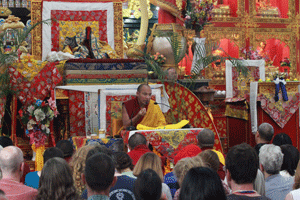21st Feb –Vajra Vidhya Institute, Sarnath.
On the 11th day of the 1st month of the Year of the Water Snake, in the holy land of Sarnath, very close to the exact site where the Buddha Shakyamuni taught his first five disciples more than 2500 years ago and thereby set into motion the entire Buddhist teaching tradition, the Gyalwang Karmapa once again turned the wheel of dharma.
Coinciding with an annual dharma seminar at Vajra Vidya Institute being led by Khenchen Thrangu Rinpoche, the Gyalwang Karmapa commenced a week-long series of teachings on a text which has been one of his personal favorites since a young age, called ‘Tri Thung Gyatsa’ or ‘One Hundred Short Instructions.’
The text, composed by the glorious 8th Karmapa Mikyo Dorje, comprises a treasury of pith instructions spanning the entire path to enlightenment. Each instruction is skillfully crafted so that the reader can enter the text at any point to find a gem of the 8th Karmapa’s heart advice and enlightened wisdom. “From time to time I myself take a look through these 100 short instructions, and I really feel that they are very beneficial for me,” the Gyalwang Karmapa said. “All of these instructions are given for serious practitioners,” he continued, “and sometimes they are extremely forthright. They go straight to the heart of the matter.”
Deciding that it would be beneficial to focus on one or two of the instructions contained within the collection, the Gyalwang Karmapa chose to begin the teachings with an instruction on ‘Rules for Karma Kamtsang Meditators’. From this somewhat abstract title, he then began by emphasizing the need to contemplate death and impermanence in order to generate a sense of renunciation from worldly concerns, as a necessary precondition to genuine dharma practice. The Gyalwang Karmapa urged those gathered to use their own intelligence in understanding and practicing the essence of Buddhism, rather than just blindly following traditions or customs.
“The essence of Buddhism is being able to distinguish what it is that we need to do from what it is that we need to give up. It is taking up virtue and giving up non-virtue. We need to identify what it is that will bring benefit to ourselves and others, and then we need to do that. We also need to identify what it is that will harm ourselves and others, and then we need to give that up. So you can condense it all into doing what is beneficial and giving up what is harmful. We need to know what the essence of dharma is, and then bring it into our lives.”
He stressed the importance of not delaying the practice of the dharma, but rather taking the teachings on death and impermanence to heart and allowing them to motivate our practice in the present moment.
“If we are going to practice the dharma, this is what it means and we need do this now in our lives. We might think that we have our whole lives to do it, but we need to start doing it from today. This is not something that we should think, ‘Oh I can start tomorrow, or I can start the next day, or I can do this when I’m older.’ We need to do dharma practice now. We cannot postpone this. We need to start it right now.”
As thousands of the Gyalwang Karmapa’s students around the world logged onto the live webcast of the teachings simultaneously from all corners of the globe, this served as a timely reminder that the vast enlightened activity of the Gyalwang Karmapa cannot be limited by time and space. The Gyalwang Karmapa’s skillful use of modern technology enables him to directly reach and teach in accordance with the needs of those both near and far. “There are many people who are not able to come to these teachings in person,” he commented, “so it seems that the best way to bring benefit to those people is to have a live webcast. This is very beneficial for them.” Live translations were offered in seven languages, including: English, Hindi, Chinese, Spanish, Polish, German, and French.
The Gyalwang Karmapa’s Spring Teachings continue daily until 28 February 2013, with the exception of 25 February (Chotrul Duchen) when other activities are scheduled to take place.



